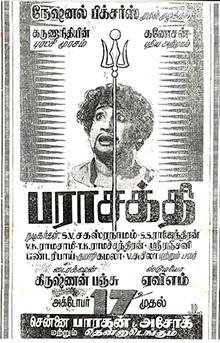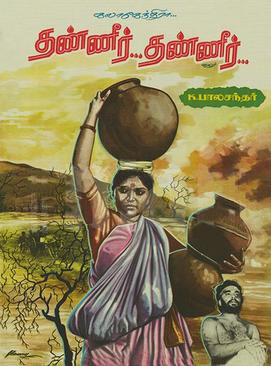
- Home
- News
- Analysis
- States
- Perspective
- Videos
- Education
- Entertainment
- Elections
- World Cup 2023
- Features
- Health
- Business
- Series
- Economy Series
- Earth Day
- Kashmir’s Frozen Turbulence
- India@75
- The legend of Ramjanmabhoomi
- Liberalisation@30
- How to tame a dragon
- Celebrating biodiversity
- Farm Matters
- 50 days of solitude
- Bringing Migrants Home
- Budget 2020
- Jharkhand Votes
- The Federal Investigates
- The Federal Impact
- Vanishing Sand
- Gandhi @ 150
- Andhra Today
- Field report
- Operation Gulmarg
- Pandemic @1 Mn in India
- The Federal Year-End
- The Zero Year
- Premium
- Science
- Brand studio
- Home
- NewsNews
- Analysis
- StatesStates
- PerspectivePerspective
- VideosVideos
- Entertainment
- ElectionsElections
- Sports
- Loading...
Sports - Features
- BusinessBusiness
- Premium
- Loading...
Premium

Light, camera, cut! When these Tamil films came under state lens
The Centre’s move to dilute the existing powers of Central Board of Film Certification (CBFC) or Censor Board through the draft Cinematograph Bill has triggered a lot of commotion in the film industry.

The Centre’s move to dilute the existing powers of Central Board of Film Certification (CBFC) or Censor Board through the draft Cinematograph Bill has triggered a lot of commotion in the film industry. One of the main issues is that the bill gives the Centre powers to review any certification given by the Board to a film and ban it if it found that the film violated norms. Interestingly,...
The Centre’s move to dilute the existing powers of Central Board of Film Certification (CBFC) or Censor Board through the draft Cinematograph Bill has triggered a lot of commotion in the film industry. One of the main issues is that the bill gives the Centre powers to review any certification given by the Board to a film and ban it if it found that the film violated norms.
Interestingly, in 2000, the Supreme Court had upheld the Karnataka High Court judgement in KM Shankarappa vs Union of India that held that the Centre has no power to call for a revision of certification given to a film which was already reviewed and certified by the CBFC. So, the bill effectively goes against the SC order.
On the other hand, the bill is against the federalist structure of the country, according to Tamil Nadu chief minister MK Stalin, who said that certification of films must be left to the states as law and order is a state subject.
He also recalled that the Centre had abolished the appellate board of film certification, where one could raise issues if they were not satisfied with the Censor Board’s certification, and described it as “a prelude to this amendment” in the bill.
Well, this is not the first time that a government has put its hand to restrict films. A number of Tamil films have in the past had tough experiences with the government.
Parasakthi – Defying God
One of the very early films to come under attack by the state government was ‘Parasakthi’ (1952), the debut film of actor Sivaji Ganesan. The plot was based on a story by Pavalar Balasundaram and screenplay and dialogues penned by former Tamil Nadu chief minister and DMK patriarch M Karunanidhi, who was at the forefront of the social reform movement at the time.
The film is about the plight of a family which migrates to India from Burma during World War II.

Released on Diwali eve, it was criticised for showing Brahmins in poor light. It was claimed that the rationalist dialogues spoken by the characters have reportedly hurt the sentiments of those who believed in God.
Following this, some people wrote letters to the state government and demanded a ban.
“The Congress government in Madras headed by C Rajagopalachari, was flooded with representations against the film and the Brahmin-controlled press published vituperative commentaries on it. Among other things, the agitated critics targeted the Film Vendor Board for their concerted attack,” writes late Jawaharlal Nehru University professor MSS Pandian, in his article ‘Parasakthi: Life and times of a DMK film’ published in the Economic and Political Weekly in 1991.
A review by a government-appointed official, however, came positive.
“The substance of the story by itself is not at all objectionable. The plot is interesting and the story has a powerful moral appeal, namely that there will be ups and downs in a man’s life,” read the report.
But the report didn’t satisfy Rajaji. He wanted to ask the CBFC to re-examine the film but the state home department was unsure whether their demand would be heard, saying the Board was responsible to the Centre, and the state government was not given heed.
In the meantime, the producers of the film, National Pictures, added three scenes to it after certification and screened it in theatres. The state government then took up the issue with the Centre. When the Union ministry of information and broadcasting pulled them up, they apologised and removed those scenes. The ministry accepted the apology and did not ban the film.
All the efforts made by the state government for over six months to ban the film went in vain. It in fact helped promote the film which became a huge hit at the box office.
Thanneer Thanneer – Thirst for power
When MG Ramachandran (MGR) came to power on the back of his newly launched party AIADMK, not many had expected him to go the way of his predecessors in banning films as he himself was the tallest icon of the Tamil film industry at the time.
The film ‘Thanneer Thanneer’ (1981) directed by K Balachander, who was introduced by MGR himself, came under attack for criticising the government and politicians.
Based on the play by Komal Swaminathan, the film deals with the issue of water scarcity in a village and about corrupt politicians behind it.

“When the play was made into a film by K Balachander, a well-known and popular Tamil film-maker, the Tamil Nadu government urged the union minister for information, Vasant Sathe, to ban it. When the request went unheeded, the police pressurised cinema theatre owners. The film disappeared from circulation within weeks, despite being exceptionally popular among the audiences,” writes MSS Pandian in his book ‘The Image Trap: MG Ramachandran in Film and Politics’.
The MGR government, a few months before MGR’s death, went to the extent of bringing a law to curb the screening of films critical of legislators and ministers, writes Pandian.
Similar to the current amendment in the Cinematograph bill, the state bill then gave powers to the state government to ban films which had been certified by the Central Board of Film Certification.
Ore Oru Gramathiley – Reservation as discrimination
In 1987, the film ‘Ore Oru Gramathiley’ faced the threat of ban, since it spoke against caste based reservation, in a state known as the land of social justice.
The film centred around a Brahmin heroine, who forges her caste certificate as Scheduled Caste and becomes an IAS officer. Interestingly, the story of the film was penned by popular lyricist, late Vaali, who was a Brahmin.
The film was denied certification by the Censor Board in August 1987. The producers then approached the now-dismantled appellate committee, which granted the permission, and the Censor Board approved it in December 1987.

Some organisations working for SC/ST welfare threatened the producer S Rangarajan that they would damage the theatres and the film if it was released.
They approached the Madras High Court, which first dismissed the petition, but a division bench revoked the certification granted to the film. Again in an overnight appeal in the Supreme Court by the film’s producer, the film got permission to be screened.
The judgement delivered by a three-judge bench headed by Justice KJ Shetty in the case is still considered a landmark one on free speech and freedom of expression.
“Movie is the legitimate and the most important medium in which issues of general concern can be treated. The producer may project his own messages which the others may not approve of. But he has a right to “think out” and put the counter appeals to reason. It is a part of a democratic give-and-take to which no one could complain. The state cannot prevent open discussion and open expression, however, hateful to its policies,” the court observed.
“The freedom of expression, which is legitimate and constitutionally protected, cannot be held to ransom by an intolerant group of people. The state cannot plead its inability to handle the hostile audience problem. It is its obligatory duty to prevent it and protect the freedom of expression,” it further noted.

Kuttrapathirikai – A long wait
RK Selvamani’s Kuttrapathirikai was based on the 1991 assassination of former prime minister Rajiv Gandhi in Sriperumbudur by a suicide bomber linked to the LTTE. It was set for release in 1993 but fate had other ideas.
Selvamani, the president of Film Employees Federation of South India (FEFSI), is known to make films based on real life incidents. His earlier films included ‘Pulan Visaranai’ (based on Auto Shankar’s life, 1990), ‘Captain Prabhakaran’ (based on sandalwood smuggler Veerappan, 1991) were box office hits.
But the government refused to grant permission to Kuttrapathirikai. The CBFC suggested several cuts in the film.
The matter went to court. After many hurdles, justices AP Shah and K Chandru in Madras High Court said there is no objectionable content in the film. They also removed the cuts suggested by CBFC.
“It takes 10 months for a woman to give birth to her child. But my film took 14 years to get released. As a creator, I was hurt much, but the judgment came as a balm. I won’t blame the officials of CBFC. Our law is like that,” Selvamani had told the media then.

